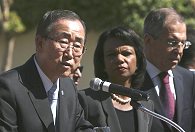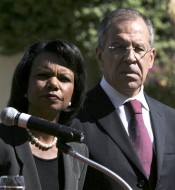voa标准英语2008年-Israelis, Palestinians Reaffirm Peace Commitmen(在线收听)
 |
| From left, U.N. Secretary General Ban Ki-moon, US Secretary of State Condoleezza Rice and Russian Foreign Minister Sergey Lavrov in Sharm el-Sheikh, Egypt, 09 Nov 2008 |
U.N. Secretary General Ban Ki Moon says he is using the influence of his office to work for peace and that all the mechanisms are in place, including the Quartet, which is the European Union, the United Nations, Russia, and the United States.
The Secretary General said he is discussing several obstacles facing the peace process at the weekend conference in Sharm el Sheikh.
"The quartet has also made clear it supports more positive strategy for Gaza," Mr. Ban said. "I have been discussing this matter with Israeli government leaders, Prime Minister Olmert and Foreign Minister Livni, on many occasions, and today I am also going to discuss this matter about the closure of crossings and road blocks and also settlement issues and demolition of houses. All these activities are not desirable for the ongoing peace process ... creation of atmosphere conducive to the ongoing peace process will be extremely important."
The Quartet's Special Envoy, former British Prime Minister Tony Blair, underlined that everyone is hoping the new U.S. administration, under Barack Obama, will focus on the peace process from its first day in office, beginning January 20th, 2009.
"The single most important thing is that the new administration in the United States grips this issue from day one and it can do so, knowing that there is a foundation on which we can build," Blair said. "For the first time, we have comprehensive political negotiations, through the Annapolis political process. For the first time, we have a proper plan to build security capability for the Palestinians, which is necessary to create a Palestinian state."
 |
| US Secretary of State Condoleezza Rice and Russian FM Sergey Lavrov attend a press conference after the Quartet meetings in Sharm el-Sheikh, Egypt, 09 Nov 2008 |
U.S. Secretary of State Condoleezza Rice has said a peace agreement will not be reached by the end of the year, but said the peace talks, which got underway at the Annapolis Maryland conference in November of last year, will continue and ultimately bear fruit.
"I do think that what we heard today from the parties, which is the most important element of this is that they believe in the Annapolis process, they believe in the integrated nature of this process that builds peace from the bottom up and from the top down," Rice said. "They believe that their negotiations are producing an atmosphere of trust as well as the foundation on which to build."
Russian Foreign Minister Sergey Lavrov also expressed hope a new peace conference, to be held next spring in Moscow, will continue the work begun at Annapolis.
"The conference which everybody agreed to have in Moscow some time next spring must certainly be a step forward, and this is why we are taking time to make sure that we prepare for it properly ... talking to the members of the Quartet, to the parties themselves, to the League of Arab States, to all those who participated in Annapolis, because our common desire is to make sure Annapolis process succeeds," Lavrov said.
Israeli Foreign Minister Tzipi Livni, says the peace talks are in the interests of Israel and the Palestinians.
"So negotiating is not a favor that Israel or the Palestinians is doing to international community, one to the other, but this is according to the interests of each people," Livni said.
Meanwhile, al Jazzera TV reports Syrian President Bashar al Assad is accusing Israel about "not being serious about peace," despite indirect talks between Israel and Syria, last held in September under Turkish mediation.
The Arab press is critical of the Palestinians for their internal conflict, with the daily Asharqalawsat running a cartoon showing negotiators from the Fatah and Hamas factions heading into a narrow alley which culminates in a dead end.